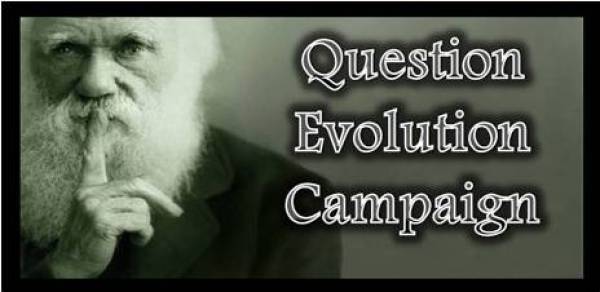Question #11.
How did blind chemistry create mind/ intelligence, meaning, altruism and morality? If everything evolved, and we invented God, as per evolutionary teaching, what purpose or meaning is there to human life? Should students be learning nihilism (life is meaningless) in science classes? creation.com/chesterton (Sourced from: 15 Questions for Evolutionists)
The hypothesis of evolution (goo-to-you evolution) is based upon the beliefs of naturalism and materialism, the beliefs that only things that can be discovered by our five senses (consisting of matter) exists. So, how did blind chemistry (unguided random chemical interactions) produce the working mind and intelligence?
We know we have a mind because we think with it, and evolutionists do not dispute the existence of the mind or intelligence, but neither the mind nor intelligence can be tasted, touched, heard, smelled or seen. Some may argue that the mind works by electrical impulses causing chemical reactions in our brains. So, what translates an electro-chemical interaction into meaningful and understandable information? I can send electrical impulses through a wire into chemicals all day long, but that will not produce a sentient mind or the intelligence of a mind.
So, where did the mind come from and how did it originate? Since the mind cannot be studied by naturalistic or materialistic methods, but can only be studied by observing the effects of the mind (answering questions, conversation, problem solving, etc.), should evolutionists deny that the mind and intelligence actually exist? They deny the existence of God as Creator for this very reason.
Evolutionists, I really want to know, where did the mind and intelligence actually come from?
How did blind chemical interactions cause meaning? Meaning cannot be measured or tested, yet we know it exists. What gives purpose to life and the things we do every day? What gives our lives meaning?
The eminent apologist for evolutionism Richard Dawkins would argue that the only meaning our bodies have is the reproduction of the selfish genes they carry.
I pose these questions to you then:
Who assigned the meaning of reproducing the genes our bodies carry as the meaning for life?
If the meaning of life is to simply reproduce our genes, then why is it mankind is driven to invent, create, think, discover, build or to have meaningful relationships? Since the only meaning our lives have is to reproduce, why is it we do so much more? Why does anyone even care about the future or how they will be remembered if our only meaning is to reproduce our selfish genes? I think Mr. Dawkins is incorrect.
Again, evolutionists, I ask you, how did blind chemicals produce meaning (purpose)? Since meaning (purpose) cannot be scientifically measured in a materialistic fashion, does meaning and purpose even exist? If not, then why would Mr. Dawkins argue that meaning does exist (even though it cannot be scientifically quantified)? So evolutionists, how did blind chemical interactions create meaning?
How did blind chemistry produce altruism? Altruism cannot be measured by materialistic means, yet we can all witness the results of altruism. You can mix any chemicals you want in a laboratory, but altruism will not climb out of the beakers. How did blind chemical interactions produce people doing good for others without expecting anything in return?
As for Mr. Dawkins, how does blind chemistry make someone spend their life, or at least a significant portion (or any portion, for that matter) doing good for others with no gain for themselves, when the only purpose for their body is to be selfish, and only serve the purpose of the selfish genes their bodies are slave to for the only purpose of reproducing them?
Evolutionists, do you have the answer to how blind chemistry created altruism?
What about morality? How did blind chemistry create morality? A chemical reaction is a chemical reaction, it is neither good nor bad, nor can it be unless someone assigns meaning or purpose to the chemical reaction; and this cannot happen unless blind chemistry has already created meaning and purpose.
So how is it the chemical reactions in someone’s brain causing them to rape someone can be considered any less moral than giving a poor person money, food, clothing or shelter? According to Mr. Richard Dawkins, the person committing the rape is at least fulfilling his purpose of reproducing his selfish genes, and it seems that at least that action would be moral, since it is the person’s only true purpose in evolution; that is, according to Mr. Dawkins. (Evolutionists, do not be foolish enough to attempt to claim I am promoting rape or even considering it is any less than absolutely morally reprehensible, WRONG, and SIN.)
What chemical interactions occur to determine that other chemical reactions are moral, and still other chemical reactions are amoral or immoral? Are the chemical reactions that make such a determination moral?
Evolutionists, you really have your work cut out for you. If the blind chemical interactions caused these things, then you do realize the same blind chemical interactions are forcing you to read this article. Maybe they want you to realize that the chemical interactions in my brain are the ones you should really believe and honor; you know, the ones that know evolution is a bankrupt hypothesis not worth of any claims to scientific integrity.
We all know that minds, intelligence, meaning, altruism and morality exist, and none of them are chemicals; nor can any of them be materialistically quantified.
So how exactly is it that the process of evolution used chemistry to produce non-materialistic things? Inquiring minds want to know (how your chemicals produced them).
Related Articles:
‘It’s not science’

great post! going to share
ReplyDelete